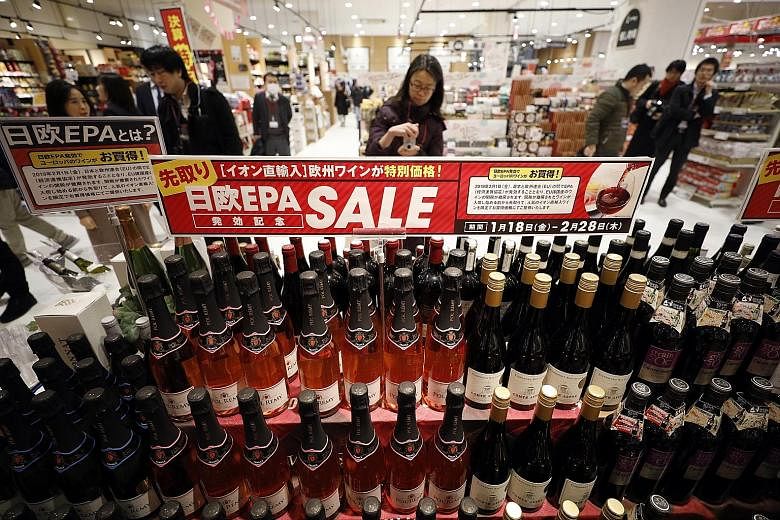The world's largest free trade deal - between Japan and the European Union - took effect yesterday, with consumers in both markets instantly enjoying cost savings on an array of imported goods from European wines to Japanese beef.
The Economic Partnership Agreement (EPA), covering 27.8 per cent of the world economy and 36.9 per cent of global trade in a market of 635 million people, comes amid protectionist pushback on the global free trade order.
Britain, which will lose the perks of the EPA when it leaves the EU next month, is keen to join the 11-nation revised Trans-Pacific Partnership (TPP) pact that took effect on Dec 30 last year.
"Europe and Japan are sending a message to the world about the future of open and fair trade," European Commission president Jean-Claude Juncker said in a statement.
"More than anything, our agreement shows that trade is about more than quotas and tariffs, or millions and billions. It is about values, principles and fairness."
Under the deal dubbed by European media as "cars for cheese", Japan will eventually scrap tariffs on about 94 per cent of imported products from the EU, while the EU will remove duties on 99 per cent of imported Japanese goods. It also folds in Paris climate deal commitments, while urging two-way business investments and ensuring the protection of intellectual property rights.
The EPA, along with the Comprehensive and Progressive Agreement for Trans-Pacific Partnership, is expected to boost Japan's economy by an estimated 13 trillion yen (S$161 billion) and create 750,000 jobs. "We expect the EPA and the TPP-11 to be new engines of growth for the Japanese economy," Economic Revitalisation Minister Toshimitsu Motegi said yesterday.
Japanese supermarkets such as Aeon and Seijo Ishii have already cut prices on imported wines from the EU, home to major wine producers like France and Italy. European wines have lost ground to Chilean imports in recent years, thanks to a bilateral free trade deal between Japan and Chile.
Meanwhile, European consumers can enjoy cheaper Japanese products from beef to green tea and seafood to sake, with the removal of duties overnight. Tariffs on imported Japanese cars will gradually be cut to zero over eight years.
Japanese duties on imported European cheese, chocolates and bags will also see steady reductions.
Cattle farmer Kazuyoshi Morimoto, from Hyogo prefecture west of Osaka, told NHK that he sees "an opportunity for more people to enjoy Kobe beef in Europe".
Some Japanese farms are concerned that the promise of cheaper European imports will hit demand for their products.
The government, in turn, will assiduously continue to address these worries by helping such small and medium-sized enterprises boost their productivity and grow their potential for exports, Economy Minister Hiroshige Seko said.
Mr Yoshimitsu Kobayashi, chairman of the Japan Association of Corporate Executives, said the EPA will boost the competitiveness of Japanese goods. He said South Korea's free trade deal with the EU, which took effect in 2015, caused a massive handicap to Japan's car and electronics industries.
Senior economist Junichi Sugawara of Mizuho Research Institute told The Straits Times he expects "innovation and productivity growth to be sparked by an active exchange of goods, services, capital, people, technology and data in both directions".
The EPA, he added, will contribute to building global standards and rules in nascent areas such as environment, medicine and data transmission.

